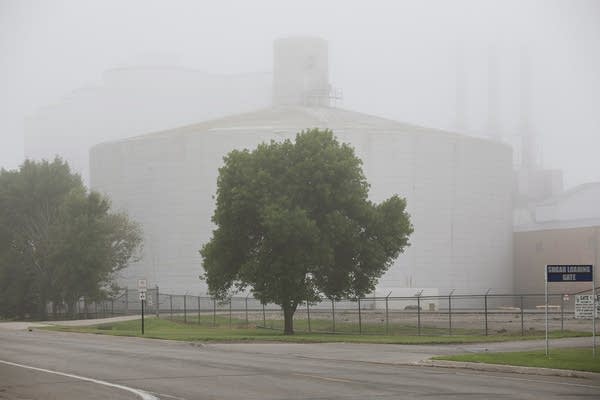No sign of breakthrough in Crystal Sugar lockout
Go Deeper.
Create an account or log in to save stories.
Like this?
Thanks for liking this story! We have added it to a list of your favorite stories.

A year after American Crystal Sugar locked out 1,300 union workers over a contract dispute, there is still no resolution, a stalemate that has put the union members in a tough spot.
These days, workers rarely picket at the company's five Red River Valley factories in Moorhead, East Grand Forks and Crookston, Minn., and Drayton and Hillsboro, N.D.
Most are busy with new jobs. Meanwhile, American Crystal Sugar is nearly finished hiring long-term replacement workers.
Still, Bakery, Confectionary, Tobacco and Grain Millers union leaders say they are confident the lockout will end soon. They hope for a settlement, arguing that American Crystal Sugar needs experienced workers back in the factories.
Turn Up Your Support
MPR News helps you turn down the noise and build shared understanding. Turn up your support for this public resource and keep trusted journalism accessible to all.
Increased operating costs because of the lockout cut into sugar beet growers' profits for last year's crop. But at $59 per ton, payments to growers for the 2011 crop were still the second highest on record, trailing only the $73 per ton paid last year for the 2010 crop.
John Riskey, president of the local union, believes economic pressure will force a settlement before the October harvest. The big question, he said, is whether farmers want to again take a loss.
"I know that the farmers just do not want to go down that path again," he said. "There is no reason why this can't come to a settlement. And Crystal Sugar has to come to the table with an agreement and negotiate and settle this."

Sugar beet growers who own American Crystal Sugar have steadfastly refused public comment on the lockout.
But so far, there's no sign American Crystal is ready to accept changes to the final contract offer that has been on the table for a year. The biggest hurdle to a settlement is contract language that union leaders say threatens job security for union workers. American Crystal wants the right to promote workers based on merit, not union seniority. The company also wants more flexibility to use temporary contract workers.
American Crystal Vice President Brian Ingulsrud said the company has weathered the cost of replacing its workforce and the resulting temporary decline in production.
"I'd say the biggest challenge was overcoming the initial cost," Ingulsrud said. "That's sort of behind us now. That's why we're looking toward the future and making sure the employees that are here are trained and able to run the factories as efficiently as possible."
"I think people will eventually continue to retire, eventually give up one at a time, find jobs elsewhere."
That position is frustrating for locked out workers after a year of economic struggle and dashed hopes as every attempt at contract negotiations failed.
Nathan Rahm is locked out of his job at the factory in Hillsboro, N.D. He said it's infuriating to watch other sugar beet factory workers at Minn-Dak cooperative in Wahpeton and Southern Minnesota Beet Sugar Cooperative in Renville sign contracts.
Like many locked out workers, he's getting by.
"I'm still doing okay I guess," Rahm said. "They're not coming to take my car away or anything like that. I think you go into starvation mode and I guess I've learned to do without certain things that I had before."
Rahm, who doubts he'll ever return to his old job at American Crystal, plans to be a union organizer. He said an important lesson he learned from the lockout is that the union was ill prepared for American Crystal's hard line in negotiations.
Union leaders told workers the lockout would never last more than a month or two.

"It's not to throw my union under the bus or anything like that," he said. "I just think that when this first started they kind of had stars in their eyes, some of the union leaders. They just wanted to believe this wouldn't happen."
Although Rahm rejected the company's contract offer three times, he's still hopeful the lockout will end. But he's not sure how many workers would want to return after the bitter dispute. Union leaders say a few dozen workers at each factory have retired or quit during the lockout. Labor relations experts say drawn out lockouts are relatively unusual, and the longer a lockout lasts, the less likely a settlement.
In a lockout, a union does not have much leverage, said John Budd, a professor of human resources and industrial relations at the University of Minnesota Carlson School of Management
Budd said if American Crystal can absorb the initial increased lockout cost, the dispute will follow a predictable path, one in which union leaders will find it hard to rally workers and others around the cause.
"I think people will eventually continue to retire, eventually give up one at a time, find jobs elsewhere," he said. "And at some point I think the likely outcome is that the union will just give up its representation rights."
Union leaders aren't throwing in the towel yet. They recently sent a letter to American Crystal proposing a return to work while contract negotiations continue. Company officials say there can be no return to work without a contract agreement.
Dear reader,
Political debates with family or friends can get heated. But what if there was a way to handle them better?
You can learn how to have civil political conversations with our new e-book!
Download our free e-book, Talking Sense: Have Hard Political Conversations, Better, and learn how to talk without the tension.







